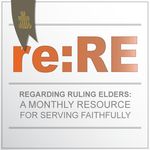“…Will you be a faithful ruling elder, watching over the people, providing for their worship, nurture, and service?” (W-4.4003i[1]). When ruling elders in the Presbyterian Church (U.S.A.) are ordained or installed, they promise to take special responsibility for the worship of the congregation they serve. This is because we understand ruling elders to be spiritual leaders in the community of faith, “persons of wisdom and maturity of faith, having demonstrated skills in leadership and being compassionate in spirit” (G-2.0301). Accordingly, it is fitting for ruling elders to have regular roles in worship, making good use of the spiritual gifts God has given them.
Ruling Elders as Worship Leaders
Glory to God: The Presbyterian Hymnal (Westminster John Knox Press, 2013), suggests a number of opportunities for ruling elders (and deacons) as worship leaders. (See the red print, or rubrics, on pages 1–22.) As the hymnal liturgies indicate, in the Service for the Lord’s Day (Sunday worship) it is especially appropriate for ruling elders to:
information provided here:
Please contact Martha Miller at martha.miller@pcusa.org and browse the Ruling Elders Web site.
- lead the prayers of the people;
- receive the offering and prepare the Lord’s table;
- lead the prayer of dedication; and
- give the charge at the conclusion of the service.
These responsibilities, fulfilled by the pastor (or teaching elder) in the practice of many congregations, are in fact quite consistent with the Christian vocation of ruling elders in seeking the welfare of the congregation, exercising good stewardship of the church’s material gifts, and leading the community in mission and ministry.
Ruling Elders Nurture Covenant Life
Beyond speaking and serving in Sunday worship (but intimately connected with these responsibilities), here are additional ways in which ruling elders can be leaders in the renewal of the church’s faith, life, and liturgy:
- encouraging deeper, more disciplined engagement with Scripture, through Christian education, small group study, and personal devotion;
- helping all members of the church discern how to live out the promises of their baptism, our common ordination to ministry in Jesus’ name;
- opening up conversations on more frequent celebrations of the Lord’s Supper, as a regular and joyful act of gratitude for God’s grace;
- making space for the full participation of children in worship, in conscious and lively ways, according to their age and ability; and
- challenging members to take up the practice of daily prayer, whether through the services provided in Glory to God, or with new resources like the PC(USA)’s Daily Prayer app (see pcusa.org/dailyprayer).
Ruling elders also have particular responsibility for the “celebration of the Sacraments” (W-1.4004b).
When the Lord’s Supper is celebrated, it is fitting for ruling elders:
- to distribute the elements (already the practice in most congregations); but also
- to participate in the “extended service of communion,” visiting homebound and hospitalized members with the message of the gospel, the prayers of the congregation, and the bread and cup (W-3.3616e).
When Baptism or the Reaffirmation of Baptism (or confirmation) is celebrated, ruling elders:
- present candidates for baptism or reaffirmation; and
- speak the words of welcome that follow the baptism or reaffirmation.
These roles reflect ruling elders’ special oversight of the covenant life of the congregation, seeking “to strengthen and nurture its faith and life” (G-2.0301).
Ruling Elders Measure Faithfulness
In addition to the options provided in Glory to God, a few other possibilities in the Service for the Lord’s Day include:
- leading the call to worship, as the session is responsible for determining times and places for the congregation’s worship (see W-1.4004f);
- speaking the summary of the Law of God (see page 4 of Glory to God) or call to faithfulness, as ruling elders are charged with “measuring” the community’s growth in discipleship (see G-2.0301); and
- reading Scripture, as the session makes provision for the proclamation of the Word (see W-1.4004a).
These are appropriate extensions of the ministry of ruling elders as outlined in the PC(USA)’s Book of Order.
Ruling Elders Offer Gifts
As we pray during the laying on of hands in ordination, God has given ruling elders “gifts of [the] Holy Spirit to build up the church, to strengthen the common life of [the] people, and to lead with compassion and vision. In the walk of faith and for the work of ministry,” we pray for “gladness and strength, discipline and hope, humility, humor, and courage, and an abiding sense of [God’s] presence” (Book of Occasional Services, Geneva Press, 1999, pp. 29–30). May all these gifts be yours as you lead the church in the worship of the triune God and in the service of daily living.
David Gambrell is Associate for Worship in the Presbyterian Church (U.S.A.) Office of Theology and Worship and editor of Call to Worship: Liturgy, Music, Preaching, and the Arts.
Con Respecto a los/as Ancianos/as Gobernantes: Liderazgo de adoración
사역장로에관하여: 예배리더십

